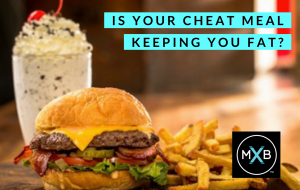
Have you ever considered that perhaps your weight loss goals are being hindered by your thoughts and state of mind? Science has proven that our thoughts and emotions have a tremendous effect on our physical state and can be the very thing that is holding us back from losing weight and having the body we want. At MBX we’ve seen hundreds of cases that have proven that by simply being conscious of your mind/body connection, you can overcome the obstacles that stand in the way of your weight-loss and physical fitness goals.
Overthinking about what you eat could be a way you stall your weight-loss efforts. When people feel insecure about their bodies or eating habits, they tend to overly restrict the types of foods they eat or the amount that they eat. The body is designed for survival. It does not know that you’re purposely restricting food— it just knows that it doesn’t have enough, so it will automatically slow down body processes, including metabolism, in order to conserve energy and survive. This biological process also initiates a primal drive to eat more in order to survive, which leads you to unconsciously overeat and obsess about food. I write more extensively about this in my How to Jump Start a Slow Metabolism: https://www.mbxfit.com/health/3-ways-to-jump-start-a-slow-metabolism/ blog. When trying to lose weight, people will gravitate toward calorie conservation, i.e., not eating all day thinking they’re lowering their calorie intake. But what ends up happening is that your body goes into starvation mode, then once you eat, your body will naturally store EVERYTHING as FAT, because it doesn’t know when it will get the fuel, i.e. calories it needs to function. Don’t overthink it and don’t restrict your calories during the day. Maintain your major meals throughout the day: breakfast and lunch, so that by dinner you won’t be starving and unintentionally overeat.
One of the biggest challenges that people face in trying to lose weight is the ever growing weight-loss fad diet/exercise industry promising to help you lose weight in a very short amount of time. It can be so confusing to understand TRUE weight-loss when there are countless philosophies and quick fix solutions. What I mean by TRUE weight-loss is weight that is lost for good, not just for a few weeks or months. Permanent weight-loss is NOT an overnight process. Therefore, thinking this way can really stall weight-loss in the long run. Depending on your age, you probably have a decade’s worth or a few of poor eating and exercise habits to not only change, but also stick to long enough to maintain results for good.
A very important part of the MBX Consultation is the diet evaluation. I cannot tell you how many consultations I’ve conducted where the person cannot remember what they ate the day before. What’s even more alarming is that 99% of the times this has happened the person didn’t think there was anything strange about that. In my professional experience I have come to believe that mindless eating is the number 1 reason for weight gain. Let’s be clear here, I am not suggesting by any means you need to be obsessive over counting calories and afraid to eat carbs. On the contrary! Here’s an analogy: Imagine you’re getting an oil change for your car and the mechanic says, “we could use this cheaper oil, it’ll clog up your engine and possibly reduce your car’s lifetime by 10 years, but it’ll save you $5; or we could use the premium oil, your car will run more efficiently and it’ll maintain the engine for 20 years, but it’s $5 more.” Which would you choose? That’s a car! We’re talking about your body and your LIFE! Eating without thinking can have an enormously negative effect on weight-loss. Not only because you may be over-eating, but also because you may be eating things that are “clogging up your engine” vs. helping you run efficiently.
Once I get my clients to be conscious of what they’re eating, I then get them to ask themselves “why?” Why are you eating that cookie right now? Cake at a birthday party makes sense, but a cookie or a few every day—is that really necessary? Are you eating because you’re hungry or because you’re: stressed, depressed, tired, sad, bored, lonely…the list goes on. Not asking yourself “why” could be a way your mind could stall your weight-loss. Once you uncover why you’re eating, you can have more control over your weight-loss. This is a simple mind coaching technique that I have seen work almost 100% of the time. Eating should be for 2 reasons: The main reason is for fuel (energy) and the second is for nutrients to maintain a healthy, illness-free body. And the more consistent we are with what we eat, the more efficient your body will be. Therefore, the best rule of thumb is to make sure you’re eating at similar times daily and eating healthful, nutritious foods regularly.
In my many years of experience, I have found that my clients will feel the benefits of exercise and diet change more rapidly than they see it. Yes, looking good in a bikini is one driving force, but weight-loss should also be about feeling good, sleeping better, feeling relaxed, alert and energetic. Focusing on looks alone could stall your weight-loss efforts! Because since seeing the results may take longer, when you focus on looks alone, you may get discouraged more easily, which may lead you to give up on your new healthier habits too quickly. Instead if you focus more on how you feel, your new lifestyle will become more pleasurable and the weight will easily come off, because your mind will completely shift to focusing on the current benefits.
Managing your weight is not merely a physical problem, but rather a problem of your whole being. After many years in my personal training career and in my experience as a psychologist, I’ve come to realize that your body is a reflection of your thoughts, feelings, attitudes and beliefs. In other words a reflection of your mental focus. The good news is that you CAN change your body with simple, conscious and mindful exercises!
Disclaimer
Although my blog topics can be very beneficial to your overall health, they are not intended for the purpose of providing medical advice. All content is for informational purposes only and is not intended to serve as a substitute for the consultation, diagnosis, and/or medical treatment of a qualified physician or healthcare provider. Every effort is made to ensure the accuracy of published information on or through my website, blog, e-mails, programs and services. However, the information may inadvertently contain inaccuracies or typographical errors. Every effort has been made to present you with the most accurate, up-to-date information, but because the nature of diet, fitness and health research is constantly evolving, we cannot be held responsible for the accuracy of our content.




Are you confused by all the conflicting diet and fitness information? Do you feel overwhelmed by what you should be doing to have optimal health? Then you’ve come to the right place!
Follow me and let me help you make sense of all of this!
